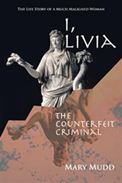
 |
Caesar Augustus is arguably one of the most important historical figures in Western civilization. His wife, Livia, has for centuries been treated by historians, from Tacitus in the ancient world to innumerable contemporary ones, as guilty of dynastic intrigue—using plotting, poisoning, and lies to further her own children's chances for inheriting the newly formed imperial seat of Rome. In this well-researched and informative redressing of her character, the author attempts to examine the evidence and rehabilitate Livia's reputation. A detailed biographical sketch of her youth and marriage to Octavian is fleshed out, followed by a critical assessment of the historical record and re-examination of the charges against her character found there. An examination of the "evil stepmother" image's popularity in the Roman mind is examined. Political motives, such as opposition to the new imperial regime, are also discussed. Logical examination of the timing and geographical location of the death of the various candidates for the inheritance, which there are in fact a disproportionately large number, provide good arguments in Livia's defense. They simply do not look plausible, either through motive or opportunity. Along the way, interesting details about Roman customs, laws, culture, and politics emerge.
The author states that she has aimed the style and content to appeal to the lay reader who is not versed in classical studies. Still, the complex workings of Roman genealogy and names can be puzzling. A chart of the Julio-Claudian dynasty and an appendix devoted to the genealogy of Livia herself helps understanding in this regard. For those versed in Latin and Greek, she provides footnotes of the original ancient passages that are cited in the text in English. Color photographs of remaining statues of the personages help visualize them for us. A short discussion of the difference between primary and secondary sources precedes an extensive bibliography for those wanting to expand their study. All in all, the result is a historical biography that simultaneously illustrates the similarities and utter strangeness of this foreign world with our own. A much-needed corrective to a long tradition of Livia-bashing, this highly readable text belongs in the hands of history students and general readers interested in the foundations of our society alike.
RECOMMENDED by the US Review